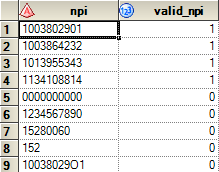Your NPI number is an important part of your healthcare business and can help coordinate your care plans. It is also included on all Medicaid and Medicare applications and is used to identify healthcare providers in financial transactions. A search engine can help you find your NPI number by state or search for it by general criteria. It also shows you other information, such as name, contact information, and address.
NPI Registry
Your National Provider Identifier, or NPI, is an alphanumeric code that identifies you as a healthcare provider. It is used in Medicare and Medicaid applications to identify providers and coordinate care. You can find your NPI number by using a free, easy-to-use NPI lookup service. These services can save you time, and ensure that you provide the correct information on your application.
There are two types of NPIs. One type is assigned to individual physicians, while another is for organizations. In addition to your NPI number, you may have other identifiers, such as a taxonomy code. You can also find your NPI by searching in the NPPES database.
UPIN (Unique Physician Identification Number)
UPIN is an alphanumeric six-position identifier assigned to all Medicare physicians, medical groups, and non-physician practitioners. The UPIN is required by Section 9202 of COBRA85 and is assigned by the Centers for Medicare and Medicaid Services (CMS). The UPIN is a digitally encoded unique number, which CMS can use to collect payment and utilization information.
In July 1993, the Centers for Medicare and Medicaid Services began a project to develop a national provider identifier. The final rule was published on Jan. 23, 2004. Since then, the National Provider Identifier (NPI) has replaced the UPIN as the preferred provider identification number.
Default location of NPI
The NPI number is unique to a provider and can be used to identify them. It can be used to track health care transactions, claims, and billing. An NPI replaces previous provider identifiers, but health plans can still use other identifiers internally. A NPI is required for all HIPAA transactions.
The NPI number is the only number that can uniquely identify a health care provider. It must be included on all claim forms submitted to payers, including claims for Medicare. It replaces legacy provider identifiers, including Medicare provider numbers and billing codes.
Types of NPIs
NPI numbers are unique identification codes that can be used to identify healthcare providers. They are generated by the National Plan and Provider Enumeration System (NPPES), which is managed by the Centers for Medicare and Medicaid Services. Each NPI Number Finder (NPI Lookup) identifies a single provider, regardless of practice location or contract. These are called Type 1 NPIs.
NPIs can be assigned to organizations or individuals based on their type. An NPI can also have an address, which can be a mailing address or secondary address. An NPI can also be associated with a taxonomy code, which is a classification of expertise. In some cases, the taxonomy code will be the principal category, while another code may be used as a secondary category.
IHCP Provider ID
Your IHCP provider ID is a nine-digit number that identifies you as a health care provider. This number is required for the submission of IHCP claims. It is also required by certain transportation providers and waiver service providers. You can obtain your IHCP provider ID by visiting the NPEES website. However, you must make sure that you have a valid NPI number to be able to use this number.
The IHCP Provider Healthcare Portal is a secure website where you can enroll in the program, update your profile, submit claims, and check your eligibility with your members. Once you’ve signed up, you’ll be enrolled and receive training and support to help you navigate the Portal.



